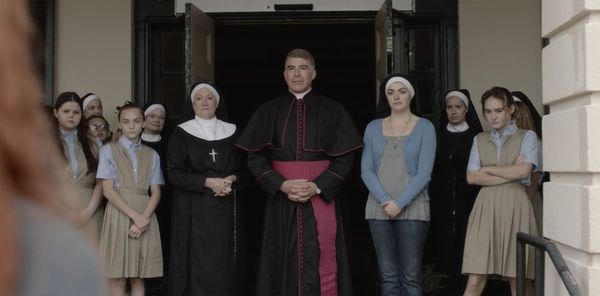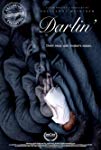Eye For Film >> Movies >> Darlin' (2019) Film Review
Darlin'
Reviewed by: Jennie Kermode

Further developing a character from The Offspring, Lucky McKee's 2011 film The Woman was a huge hit on the festival circuit, too violent for most mainstream cinema fans but never gratuitously so. Pollyanna McIntosh delivered a remarkable performance in the title role, her feral character kept prisoner by a lawyer convinced he could civilise her. Now the Woman is back, with McIntosh herself at the helm; it's perhaps the closest we can get to seeing the world from her perspective.
A character like this, so complex and formidable, can easily overwhelm a film. Although we see more of the Woman's story here, she is sensibly kept in the background, the main focus being on Darlin', the little ginger-haired girl who was adopted by her at the end of the last film (which you don't need to have seen for this story to make sense). Darlin' is now thought to be about 16, though she looks younger, as malnourished children inevitably do. She's now completely feral, unable to speak, wary of any physical contact with strangers - but the Woman takes her to a hospital for reasons initially unclear, and once she's inside she's no longer in control of her destiny.

Where The Woman saw its heroine kept in chains, Darlin' explores subtler forms of control - ones, indeed, that we've seen from the other side in quite a number of films, with savage children gradually won over by the benefits of civilisation. The hospital is run by a Catholic charity whose head immediately sees the girl as a windfall. Saving her soul, converting and civilising her could have great public appeal and help to attract much-needed donations. For all her wildness, she's a quick learner and she's drawn to kindness, first from nurse Tony (Cooper Andrews) who is kept at arm's length because he's gay and then from a young nun (Nora-Jane Noone) with troubles of her own. She also connects quickly with other girls in the boarding school where she's placed. Perhaps this isn't all bad. Perhaps these people can help her. She doesn't want to have a Devil inside here. But as she learns, her shifting perspective makes her tremble at the thought of how she lived before - and out there, somewhere, the Woman is still looking for her.
Thematically there's a lot going on here: the legacy of colonialism intertwined with patriarchal control, the shadow of child abuse within the Catholic church and the complexity of a society that has never fully succeeded in taming everybody. in the school, the girls are drawn to Darlin's shocking behaviour, sharing secrets of their own. The Woman connects with a group of alcoholic women who live a semi-feral existence on the borders of the city. Tony, despite being a civilised man, has an outsider's perspective which has shown him that there's more then one way to look at the world, and he's quick to recognise the tenderness that the Woman feels towards the girls who has become like her own child.
If this sounds as if it might get too heavy, fear not - it's leavened with comedy, poking fun at the absurdity of civilised life as the outsiders see it but not letting them off the hook either. There's also that inescapable violence, the film's black humour reaching its apogee in a scene where the Woman is confronted by a clown. Thee woman who befriend her find her compelling, exciting, but also terrifying - and no matter how carefully she's tamed, we never quite lose sight of Darlin's potential to behave in the same way.
Lauryn Canny is stunning in the central role, easily adopting the same body language that Mcintosh has used continually to break away from conditioned patterns of movement and take up space. Despite her small stature, Canny is every bit as frightening when she lunges and snaps. Muscular legs, loose shoulders and a preference for squatting or jumping speak of life in the wild as surely as the dirt that initially coats her pale features. To transition from this to a more normal (and less natural) pattern of behaviour over the course of the film is no small feat. She's aided by strong writing from Mcintosh. Although the degree of competence with language that she develops is perhaps a little unrealistic (most feral children never acquire complex grammar), there's a potent reminder, close to the end, that they way in which she conceptualises the world around her remains very different.
The film is beautifully photographed and notable for the way in which it avoids objectifying its too--often fetishised Catholic schoolgirls, instead finding its compulsive beauty in the wild landscapes to which Darlin' often longs to return. The girls feel real and complicated and healthily unreasonable, their humanity in centre frame. There's a bit of wildness in everyone and Darlin' invites us to celebrate it.
Reviewed on: 08 Jul 2019















